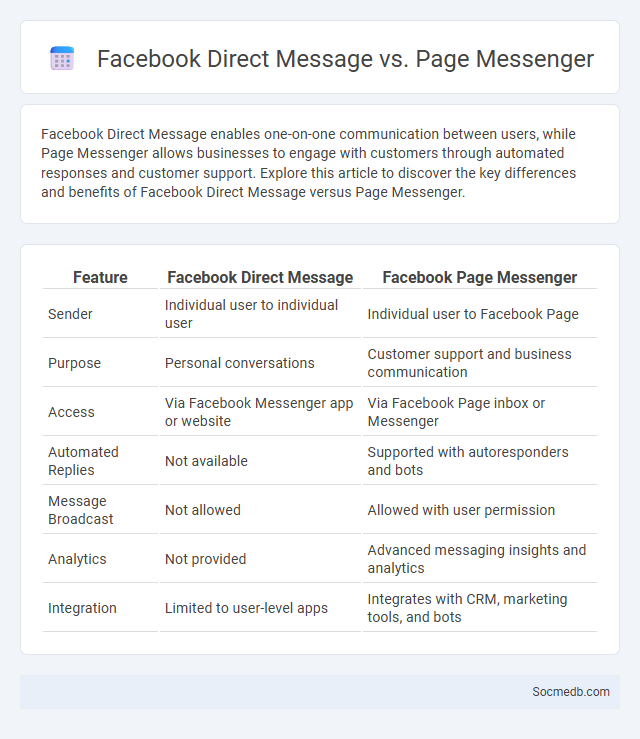
Photo illustration: Facebook Direct Message vs Page Messenger
Facebook Direct Message enables one-on-one communication between users, while Page Messenger allows businesses to engage with customers through automated responses and customer support. Explore this article to discover the key differences and benefits of Facebook Direct Message versus Page Messenger.
Table of Comparison
| Feature | Facebook Direct Message | Facebook Page Messenger |
|---|---|---|
| Sender | Individual user to individual user | Individual user to Facebook Page |
| Purpose | Personal conversations | Customer support and business communication |
| Access | Via Facebook Messenger app or website | Via Facebook Page inbox or Messenger |
| Automated Replies | Not available | Supported with autoresponders and bots |
| Message Broadcast | Not allowed | Allowed with user permission |
| Analytics | Not provided | Advanced messaging insights and analytics |
| Integration | Limited to user-level apps | Integrates with CRM, marketing tools, and bots |
Understanding Facebook Direct Message
Facebook Direct Message enables private communication between users through instant text, images, and videos within the Facebook Messenger platform. It supports features such as read receipts, typing indicators, and end-to-end encryption for secure conversations. Understanding its integration with Facebook's social ecosystem helps businesses enhance customer engagement and personalize marketing strategies effectively.
What is Page Messenger on Facebook?
Page Messenger on Facebook is a communication tool integrated into your business or brand's Facebook Page, allowing real-time interaction with customers through instant messages. It supports personalized responses, automated chatbots, and customer service, enhancing engagement and driving meaningful conversations. Using Page Messenger improves your customer support efficiency and fosters stronger relationships with your audience on the platform.
Key Features of Facebook Direct Message
Facebook Direct Message offers seamless, real-time communication with rich media support including photos, videos, and voice notes. You can create group chats, share links, react with emojis, and use end-to-end encryption for secure conversations. Integration with Facebook's Marketplace, Stories, and other apps enhances your messaging experience by providing quick access to shared content and interactive features.
Core Functions of Facebook Page Messenger
Facebook Page Messenger enables real-time communication between businesses and customers through instant messaging, enhancing customer support and engagement. It supports automated responses, appointment booking, and lead generation via chatbots, streamlining user interactions. Integration with Facebook's advertising tools allows targeted message campaigns to drive conversions and improve customer retention.
Direct Message: General Overview
Direct Message (DM) on social media platforms serves as a private communication channel enabling users to exchange personal, instant messages including text, images, videos, and links. This feature enhances user engagement by facilitating confidential conversations, customer support, and targeted marketing without public visibility. Social media giants like Instagram, Twitter, Facebook, and LinkedIn leverage direct messaging to increase user interaction, improve retention, and provide valuable data analytics for businesses.
Differences Between Facebook DM and Page Messenger
Facebook DM refers to Direct Messages between individual users on Facebook, enabling private, one-on-one conversations with friends or contacts. Page Messenger, on the other hand, is designed for businesses and public pages to communicate with customers, offering features like automated responses, customer support integration, and message filtering. While Facebook DM emphasizes personal interactions, Page Messenger is optimized for managing customer inquiries and enhancing brand engagement.
Privacy & Security: Comparing Messaging Options
When choosing a messaging app, evaluating privacy and security features is crucial for protecting your personal data. End-to-end encryption ensures that only you and the recipient can read messages, making platforms like Signal and WhatsApp preferable for secure communication. Be aware of data storage policies, metadata handling, and potential vulnerabilities to maintain control over your private information.
User Experience: DM vs Page Messenger
Direct Messages provide a personalized and private communication channel that enhances Your interaction with followers, allowing for tailored responses and increased engagement. Page Messenger, on the other hand, facilitates more streamlined customer service by integrating automated replies and managing multiple inquiries efficiently. Optimizing the use of both tools helps create a seamless user experience that balances individual connection with scalable support.
Best Use Cases for Each Messaging Method
Text messaging excels in delivering concise, real-time updates and personalized promotions directly to your audience's mobile devices, ensuring high engagement rates. Email marketing is ideal for detailed content, newsletters, and building long-term customer relationships through tailored campaigns and automated workflows. Social media platforms like Instagram and Facebook are powerful for interactive storytelling, community building, and targeted advertising that leverages visual content and user-generated interactions.
Choosing the Right Facebook Messaging Tool
Selecting the ideal Facebook messaging tool involves evaluating features such as automation capabilities, integration with CRM systems, and user-friendly interfaces to enhance customer engagement. Tools like ManyChat, MobileMonkey, and Chatfuel offer robust options for creating chatbots that streamline communication and increase response rates. Prioritizing scalability, analytics, and customization ensures the messaging solution aligns with business objectives and improves overall social media customer support.
 socmedb.com
socmedb.com